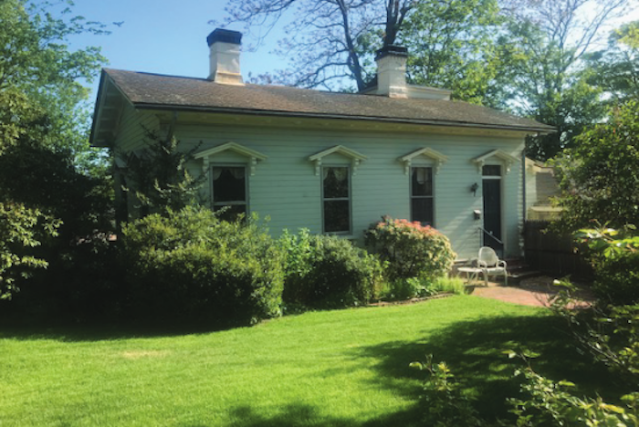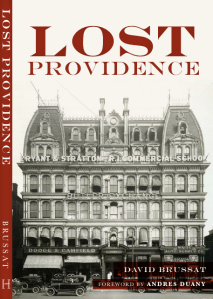
Project area between Williams and John streets, in Providence; arrow points to cottage. (PHDC)
Monday’s meeting via Zoom of the Providence Historic District Commission surprised observers by delaying an expected vote to approve the relocation of a historic Italianate cottage on Williams Street, on College Hill. This was the second straight delay. That does not mean a project that neighbors oppose will be abandoned. But it does raise some questions about history.
How does this cottage fit into the grand sweep of Providence history? It depends on an infinity of historical details, not many of which are definitely known. The little cottage sits in a deeply historical neighborhood. Some opponents of the relocation do not object so much to the new siting – the cottage had been moved to its current location some 130 years ago – as to the fact that moving the cottage yet again will open the door to a vague plan for additional houses behind the cottage, spoiling the neighborhood’s historical character and sacrificing one of College Hill’s oldest and largest woods.
I sat in on parts of the PHDC meeting and heard some real nitpicking from commissioners who, I had heard, were largely unopposed to the proposal at a June 22 meeting (where the larger plan was delayed). One after another, they objected to its proximity to the street, to the profile of the roof line of the new addition, to the way the new foundation would crowd the roots of a tree, and to how the new foundation would lift the cottage too high above street level. These and other generally picayune objections – voiced more sharply than they might be if the commissioners were still on board – hinted at trouble. Shortly afterward, the PHDC did indeed vote to delay.
So what happened? Did the objections to the relocation mask new feelings about the larger development? Was the commission influenced by the large attendance at the Zoom meeting by neighbors – 25, excluding those said to have been unable to log on? Was there a battle in some commissioners’ minds over whether to heed the regulations, as required, or to hesitate on behalf of some more important issue that was unstated?
The developer will return to the commission after tinkering with the cottage. Most likely, the commission will approve the relocation and then, in time, approve new townhouses behind the cottage on proposed subdivided lots where the woods are today. This is the fate suggested by the grand sweep of Providence history, with more erosion of its historical character doomed to follow, leading, as it has in the past, to further decline in the city’s beauty, its quality of life and its long-suffering economy.
Yet, notwithstanding the minor details of a minor proposal to relocate a small but enticing cottage, perhaps a shift in the grand sweep of local history can be detected in the commission’s vote. It is all the rage now to exaggerate the influence of the coronavirus pandemic on every aspect of human life. Online collections of published articles in the field of architecture, such as ArchNewsNow.com, are almost exclusively devoted to how building and city design must change to meet the needs of Covid-19 far into the future. Many of these articles declare that all new houses must have home offices, and indeed Friedrich St. Florian, designer of the townhouses projected to go up behind the cottage on Williams Street, says they will have home offices, too, as will the cottage itself, by way of the proposed addition.
But suppose the market for home offices is offset by a market shift caused by a popular desire for less population density in cities like Providence? Maybe the existing woods seem more valuable for both the neighborhood and the city than before the pandemic. That could turn the grand sweep of history around. Maybe a conscious or unconscious recognition of that possibility can explain Monday’s PHDC vote to delay its approval of the relocation of the cottage. Or maybe not. We must wait and see.

Small Victorian cottage whose relocation was at issue in Monday’s PHDC meeting. (PHDC)



The PMC may be thinking that we will all be working from our home offices soon, but the ruling class will soon figure out that they can do without the vast bureaucracies that have metastasized in the past decades, and you’ll need to rent that extra room out to make the mortgage….
LikeLike
What will that mean for our downtowns, Peter? It may be good if the shrinkage of bureaucracies means a decline of office space. I’m worried, however, that there might not be over time enough office workers to sustain a downtown economy. But … fill ‘er up with residential – if anyone wants to live in a downtown. At bottom, however, all of my handwringing assumes that covid will continue to beat down on us unto eternity. I rather expect that its run and its influence will be shorter than we are now supposing.
PMC?
LikeLike
A decline in office space, well, in Belgium here, the new style of residential homes are homes which look like offices. Also the environment, the ‘gardens’ (if they are worth that name), are mostly stone, crude iron fences , and if there is some nature, it is for decoration of the parking space, which may hold up to three cars. Also the colours are office style, black and grey. I don’t think the style is typically Belgian. So, these bureaucrats will be doing some other job, building their home offices next to you.
LikeLike
To add an example (see below), office dwellers, nursed in offices, managerial class or bureaucrats absolutely love this style. So, having to work from home they will be expanding into your neighbourhood, instead of being confined to office areas. Being nursed in offices, they feel comfy in such homes like a babies in their cradle. Even more, being mobile in their brute big shiny tin cans on wheels, also called a car, they build them in rural areas.
The white building on the second photo, it has even nothing which makes it look like a home, and this more pretentious exhibitionist style is the home office style of the ‘creative class’ (designers, marketeers, etc). This one, on the photo still unfinished is currently finished, as you can see the designers toys, apple computers and screens, and office style furniture through the large windows. It is really a residential place though.
LikeLike
God, how awful!
LikeLike